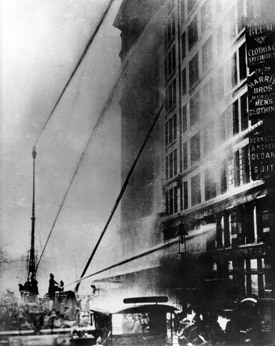
Brown Brothers Photographers and the International Ladies Garment Workers Union Archives, Kheel Center, Cornell University
On Saturday, March 25, 1911, New York firefighters spray water at the burning Triangle Shirtwaist Company in Manhattan, although the mist was too weak to put out the fire by the time it reached the top floors. One hundred forty-six workers died, mostly women and children, unable to escape through blocked exits. Some leaped from windows to escape the flames and smoke. It was one of the deadliest workplace disasters in the United States. It also became one of the most important events in labor law history. On the top three floors of the building, immigrants as young as 14 years old sewed shirtwaists (now known as blouses) in cramped and unsafe conditions. They often worked 72 hours a week -- 12 hours a day, six days a week. In 1909 they went on strike asking for a 52-hour workweek. In 1911, it was a booming industrial time and about 100 people died every day in the United States during workplace accidents. The New York legislature responded to the Triangle fire by enacting legislation to ensure better working conditions and provide fire safety measures. It then spurred national labor laws to be reformed. The factory owners were acquitted of manslaughter.

Brown Brothers Photographers and the International Ladies Garment Workers Union Archives, Kheel Center, Cornell University
On Saturday, March 25, 1911, New York firefighters spray water at the burning Triangle Shirtwaist Company in Manhattan, although the mist was too weak to put out the fire by the time it reached the top floors. One hundred forty-six workers died, mostly women and children, unable to escape through blocked exits. Some leaped from windows to escape the flames and smoke. It was one of the deadliest workplace disasters in the United States. It also became one of the most important events in labor law history. On the top three floors of the building, immigrants as young as 14 years old sewed shirtwaists (now known as blouses) in cramped and unsafe conditions. They often worked 72 hours a week -- 12 hours a day, six days a week. In 1909 they went on strike asking for a 52-hour workweek. In 1911, it was a booming industrial time and about 100 people died every day in the United States during workplace accidents. The New York legislature responded to the Triangle fire by enacting legislation to ensure better working conditions and provide fire safety measures. It then spurred national labor laws to be reformed. The factory owners were acquitted of manslaughter.

 Don’t let misconceptions cause faith to waver
Don’t let misconceptions cause faith to waver Seniors, whatever storms may come, Jesus will be there
Seniors, whatever storms may come, Jesus will be there Studio 3:16 offers new approach to teaching religion
Studio 3:16 offers new approach to teaching religion After three decades, NLR principal plans to retire
After three decades, NLR principal plans to retire CHS athlete overcomes odds to reach collegiate goal
CHS athlete overcomes odds to reach collegiate goal St. Joseph a model of solidarity with immigrants
St. Joseph a model of solidarity with immigrants Two gifts after Jesus’ death: Virgin Mary and Eucharist
Two gifts after Jesus’ death: Virgin Mary and Eucharist Why we have an altar, and not just a communion table
Why we have an altar, and not just a communion table Pope: Wars should be resolved through nonviolence
Pope: Wars should be resolved through nonviolence  Living relationship with Jesus Christ in the Eucharist
Living relationship with Jesus Christ in the Eucharist